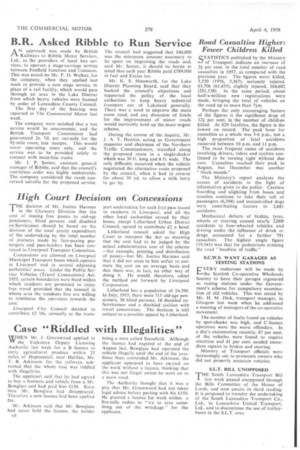B.R. Asked Ribble to Run Service Road Casualties Higher: A N
Page 44

If you've noticed an error in this article please click here to report it so we can fix it.
approach was made by British Railways to Ribble Motor Services, Ltd., as the providers of local bus services, to operate a stage-carriage service between Foxfield Junction and Coniston. This was stated by Mr. F. D. Walker, for the company, when they applied last week to provide a new stage service, in place of a rail facility, which would pass through an area in the Lake District from which heavy vehicles were banned by order of Lancashire County Council.
The first day of the hearing was reported in The Commercial Motor last week.
The company were satisfied that a bus service would be uneconomic, and the British Transport Commission . had guaranteed 2s. 7d. per ear-mile for the 91-mile route, less :eceipts. This would cover operating costs only, and the service was to be provided solely to connect with main-line trains.
Mr. J. P. Senior, assistant general manager of Ribble, said that the council's restriction, order was highly undesirable. The company considered the roads concerned suitable for the proposed service.
The council had suggested that £40,000 was the minimum amount necessary to be spent on improving the roads and, • said Mr. Senior, it should be borne in mind that each year Ribble paid £589,000 in fuel and Excise tax.
Mr. K. S. Hmsworth, for the Lake District Planning Board, said that they backed the council's objections and supported the policy of the local authorities to keep heavy industrial transport out of Lakeland generally. There was a need to improve the main coast road, and any diversion of funds for the improvement of minor roads would inevitably hold up the more urgent scheme.
During the course of the inquiry, Mr. J. A T. Hanlon, acting as Government inspector and chairman of the Northern Traffic Commissioners, travelled along the proposed route in a single-decker which was 30 ft. long and 8 ft. wide. The only difficulty occurred when the vehicle negotiated the alternative route proposed by the council, when it had to reverse for about 30 yd. to allow. a milk lorry to get by.












































































































